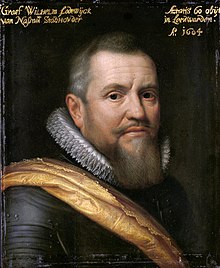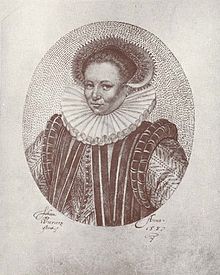Wilhelm Ludwig (Nassau-Dillenburg)
Wilhelm Ludwig (born March 13, 1560 in Dillenburg ; † May 31, 1620 in Leeuwarden ), called Us Heit ( West Frisian Our Father ), was Count of Nassau-Dillenburg and governor of Friesland , city and country ( Groningen ) and Drenthe .
Life
Wilhelm Ludwig was the eldest son of Count Johann VI. von Nassau-Dillenburg , the brother of Wilhelm I of Orange . When his father Johann became governor of Gelderland in 1578 , he received a regiment of German infantry at a young age, at the head of which he took part with distinction in the battles in the north and east of the Netherlands against the Spaniards.
As a staunch Reformed man , he soon won the trust of his uncle and the patriots. His calm and energetic demeanor, his unpretentiousness and firmness impressed everyone and distinguished him sharply from the irrepressible Philipp von Hohenlohe , Dietrich Sonoy or Enten, whom he far surpassed with his pronounced military talent. Wilhelm of Orange appointed Wilhelm Ludwig as his deputy in Friesland and after his death he was his successor. With tenacious energy he fought against Francisco Verdugo under the most difficult circumstances on the Frisian borders . In the difficult years of Leicester's government he remained loyal to the Dutch and fought against the excesses of the ultra-Calvinists who tried to deliver Friesland to the Queen of England. The Frisian rulers found loyal support in him and did not abandon him when Karl Roorda tried to make the province completely republican, even if he had to put up with some diminution of his governing power.
With no less zeal than his cousin Moritz von Orange , he studied war science and tried to introduce a new tactic. When he was not in the field, he let his soldiers exercise diligently according to the Roman model in the Leeuward garrison, where he was based. The campaigns of the 1590s, in which he played an important if not brilliant part, showed the fruits of his work. Without his help, Moritz would certainly not have been able to solve his task of liberating the seven provinces in a few campaigns so brilliantly. After Groningen was surrendered or returned to the Union, they registered the governorship of the newly organized Province of City and Country and the Drenthe Region. However, the plan failed, by uniting the latter with the city of Groningen and the "Ommelanden" to form a single province, a less uncomfortable political institution in the northeast, as Johan van Oldenbarnevelt and Wilhelm Ludwig had wished.
Wilhelm Ludwig seems to have been on good terms with the lawyer Oldenbarnevelt for a long time. His calm, thoroughly practical nature got along better with him, since although he was strictly reformed, he always gave room for political considerations. Wilhelm Ludwig does not seem to have shared the lawyer’s view that it was necessary to make peace with Spain for a longer or shorter period of time, even though he was the first deputy of the States General to take part in the negotiations that began in 1607, as did the twelve-year-old's document Armistice signed. Even then, the religious turmoil had broken out, which made the armistice one of the saddest periods in Dutch history.
Wilhelm Ludwig took a firm side for the Calvinists, the counter-demonstrators, who also had by far the majority among the Frisian and Groningen regents. This had already contributed to the founding of the Frisian University in Franeker in 1585, although the main reason was the Frisians' wish not to be dependent on Holland in any way, but to be completely dependent on themselves. When Groningen University was founded in 1614 during the first years of the standstill , however, the prevailing view was that it was necessary to found a university that was orthodox to deal with libertine suffering , so that the young preachers in the northern provinces at least had an influence on their education the Arminians were withdrawn.
Wilhelm Ludwig put his heart and soul into the work and ensured that orthodox professors were appointed. Determined as he was, he couldn't stand his cousin's long hesitation. In his letters from those years he urged Moritz to take a decisive stance against the lawyer and his libertine and remonstantic supporters. But as determined as he steered towards the overthrow of the power of the lawyer and his like-minded fellows, he was certainly averse to the systematic war of revenge that was waged by his opponents after Oldenbarnevelt's capture. He was a man of moderation and understanding who was concerned with the purity of religion rather than political power and the positions of fallen opponents like so many of Oldenbarnevelt's enemies. Wilhelm Ludwig died on May 31, 1620.
His marriage to Anna von Orange-Nassau was childless. His inheritance and dignity fell to his brother Ernst Casimir , the progenitor of the Frisian branch of the Nassau family.
literature
- Werner Hahlweg : Wilhelm Ludwig von Nassau and the Cannae problem. In: Nassau Annals. 71, 1960, pp. 237-242.
- Pieter Lodewijk Muller : Wilhelm Ludwig (Count of Nassau-Dillenburg) . In: Allgemeine Deutsche Biographie (ADB). Volume 43, Duncker & Humblot, Leipzig 1898, pp. 134-136.
- Uwe Schögl (Red.): Orange. 500 years of portraits of a dynasty from the portrait collection of the Austrian National Library, Vienna and the Dutch Royal Collection The Hague. (Exhibition from February 1 to March 19, 2002, Camineum of the Austrian National Library, Vienna). Austrian National Library et al., Vienna 2002, ISBN 3-01-000028-6 , p. 121.
| predecessor | Office | successor |
|---|---|---|
| Johann VI. |
Count of Nassau-Dillenburg 1606–1620 |
George |
| personal data | |
|---|---|
| SURNAME | Wilhelm Ludwig |
| BRIEF DESCRIPTION | Count of Nassau-Dillenburg and governor of Friesland, town and country (Groningen) and Drenthe |
| DATE OF BIRTH | March 13, 1560 |
| PLACE OF BIRTH | Dillenburg |
| DATE OF DEATH | May 31, 1620 |
| Place of death | Leeuwarden |

